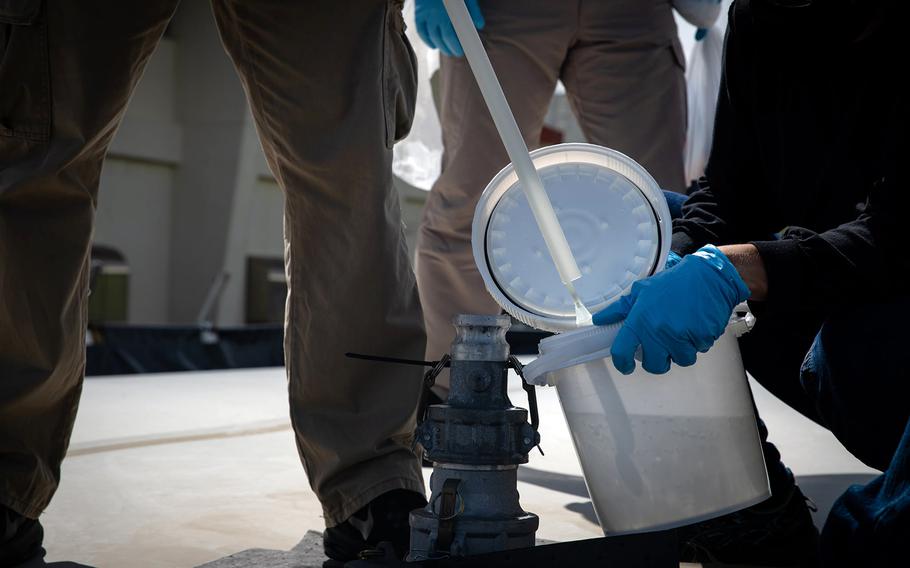Marine Corps
Okinawa governor wants on-site scrutiny after water samples show toxic discharge from Marine base
Stars and Stripes September 15, 2021

Japanese officials collected samples of treated wastewater at Marine Corps Air Station Futenma, Okinawa on July 19, 2021. (U.S. Marine Corps)
CAMP FOSTER, Okinawa — Okinawa Gov. Denny Tamaki called for an on-site investigation after high levels of toxins were found in wastewater flowing last month from a Marine base on the island.
Ginowan city said it sampled water just outside Marine Corps Air Station Futenma’s fence line on Aug. 26, approximately two hours after the Marines began dumping treated wastewater into the public system.
The water had combined concentrations of PFOS and PFOA more than 13 times higher than Japan’s safety target, Ginowan city wrote in results published to the city website Friday.
“With regard to the test results from Ginowan city, we would like to continue to request the U.S. military for on-site investigations on the base,” Tamaki told reporters on Friday. He did not comment further.
A spokesman for Marine Corps Installations Pacific did not respond to an email from Stars and Stripes seeking comment on Monday.
The Marine Corps released an unknown amount of treated wastewater into the public system at about 9:30 a.m. Aug. 26. The water came from underground tanks and contained spilled firefighting foam that included contaminants PFOS and PFOA.
The synthetic compounds are found in the foam, aircraft grease, water-repellant materials and fluorine chemicals. They have been known to cause tumors, increases in body and organ weight and death in animals.
The Marine Corps said it treated the water prior to its release to a point its toxic levels were 20 times below a provisional threshold set by Japan. Tamaki at the time said he was caught off guard by the release and demanded it stop.
Two hours after the discharge began, Ginowan’s Sewage Facility Division took wastewater samples from a manhole in the Isa area, where MCAS Futenma’s wastewater meets the public system, according to the city website.
The sample showed a PFOS concentration of 0.63 micrograms per liter and a combined concentration of PFOS and PFOA of 0.67 micrograms per liter, the city said. Japan’s safety threshold for drinking water is 0.05 micrograms per liter.
“The results were highly unexpected and greatly different from the PFAS concentration value of treated water” observed during an onsite visit to the base treatment facility on July 13, the website said. “This is highly regrettable, and we are currently considering future measures.”
The city said it also discovered 0.069 micrograms of perfluorohexane sulfonate, or PFHxS. The synthetic compound is in the same family of perfluorochemicals as PFOS and PFOA, according to the National Center for Biotechnology Information.
Discharged wastewater eventually reaches the ocean, according to the agency responsible for the island’s water quality.
A Ginowan city official requested questions in writing from Stars and Stripes on Monday but had not responded by Wednesday.
The Ginowan waterworks and sewage bureau asked the Marines to incinerate treated water that contains PFOS and other pollutants rather than discharge it into the wastewater system, according to the website.
They took samples that do not include treated wastewater and plan to release those results soon.
Okinawa prefecture also took water samples from the same site and expects results back next week, a spokeswoman from their Sewage System Division told Stars and Stripes by phone on Monday.
“Regarding the recent water release, we are fully aware of the concerns of local citizens, including the citizens of Ginowan city,” an Okinawa Defense Bureau spokesman said by phone on Tuesday. “However, the Ministry of Defense would like to refrain from commenting on the investigation conducted by the local government.”